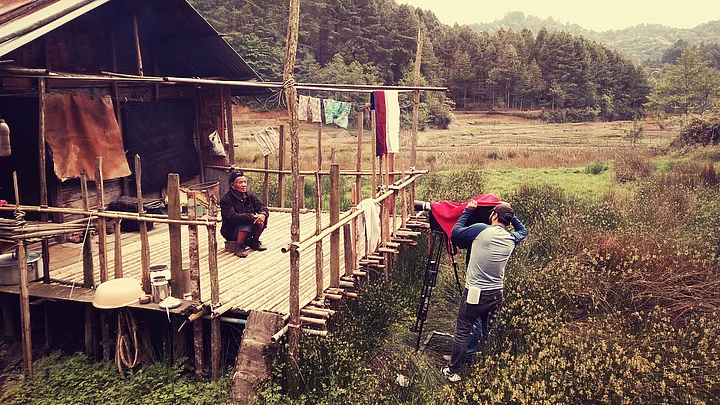Last Thursday at 8 in the night, I found myself hanging off the ledge of a bamboo house in a remote village in Ziro of Arunachal Pradesh, trying to make a naked bulb swing back and forth in pitch darkness. We were trying to make a shot look ‘windy’ and in the absence of a wind machine, it was my job to make sure that the bulb, which was dangling from a wire outside the house, looked authentically “wind struck”.
The reason I landed up in Ziro valley, which is over 3000 kms away from
Mumbai, was to assist my friend Amar Kaushik in making a short film titled Aaba that he had
written. Set in Arunachal Pradesh, where Amar had grown up, the film set
amongst the Apatani tribe is a touching story of a little girl and her
grandfather. The script excited me enough to pitch in for the project against
all odds, which included a bone-rattling 14-hour-drive from Guwahati to
Ziro.
The two things that I learnt on reaching the border between Assam and Arunachal Pradesh were that:
- You need an ‘Inner Line Permit’ to enter Arunachal Pradesh even if you are an Indian. Simply shouting ‘Bharat Mata Ki Jai’ won’t do it.
- There are hardly any cinema halls in the entire state. Arunachal has the highest number of regional languages in India, so there is no single language which could help give birth to a regional film industry there.
As luck would have it, Amar chose to shoot his film in a place which didn’t have adequate electricity, didn’t have back-up equipment, didn’t have trained actors, the film didn’t have a budget and last but not the least, we were in a place where it just wouldn’t stop raining. Basically, all the basic elements required to roll and wrap a decent film within a scheduled time were crossed out.
But what we lacked was more than made up with the enthusiasm the
team put into the project, especially the locals. Most of the crew on the
ground were Apatanis. The set handler, dress department, casting agent and
other crucial talents were all from Ziro itself. What was evident at
ground Ziro was the immense leap that that had happened in just 3
generations. For example, the older generation of Apatani women are
distinctively noticeable with their traditional nose plugs and are seen weaving or farming,
while the younger generation is hooked on to their mobile phones playing Candy
Crush.
The main ‘lead’ of the film was a 80+ Apatani village elder named Dani Randa, and his granddaughter in the film was played by his real grandchild, a delightful little 10-year-old kid called Sunku.
Now what’s interesting here was that Sunku was a complete natural in front of the camera - Expressive. Livewire. Spontaneous.Her granddad was the total opposite - Conscious. Rigid. Unemotional.
And you couldn’t blame him, he belonged to a generation of
Apatanis who perhaps never saw a film in their lives, so the concept of acting
out scenes in a non-linear format was completely alien.
Before we dived into production, the main challenge for the director was to convince the 82-year-old Apatani, who had never seen a film in his life, to play a part in one. Be it Amitabh Bachchan from Juhu, Mumbai or Dani Randa from Ziro, Arunachal – the best way to get an actor onboard your film is to win his confidence.
Unlike the new generation of Apatanis, Dani did
not know Hindi, which added to our problems in communicating with him. To
establish a connection with his main actor, Amar parked himself in Dani’s
modest bamboo hut with a local interpreter and over the next few days he ate,
slept and lived at Dani’s house bonding with him and winning his trust. Once our man was finally convinced, an impromptu ‘acting workshop’ commenced in which an
amused Dani was taken through motions of emoting on the call of ‘Action!’.
The 6-day-shoot just zipped past. We trudged out of our unassuming guest house at 5 in the morning and returned well past sun down after trekking through mud, slush, rain and fighting off blood-sucking leeches to get that perfect shot.
And at the end of it all, the film gave birth to a reluctant
octogenarian Apatani actor; for on Day 3, after the director had “okayed” a
take, our man Dani Randa gruffly mumbled something in Apatani to the
interpreter. We learnt that he wasn’t happy with the
shot he had just given and wanted another take!
(You can connect with Suresh Mathew on Twitter @Suresh_Mathew_)
(At The Quint, we question everything. Play an active role in shaping our journalism by becoming a member today.)
